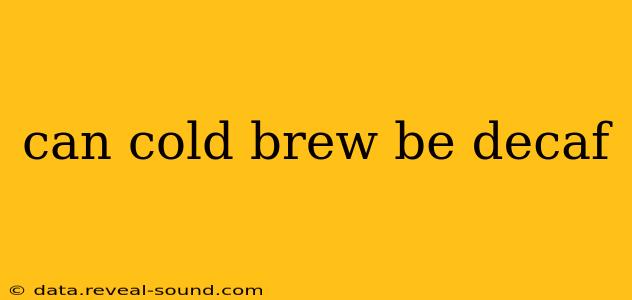Can Cold Brew Be Decaf? Yes, and Here's How
The short answer is a resounding yes! Cold brew coffee can absolutely be decaffeinated. While many associate cold brew with its bold, intense flavor profile often attributed to using regular beans, the decaffeination process is entirely compatible with the cold brewing method. This means you can enjoy all the smooth, low-acidity benefits of cold brew without the caffeine jitters.
This article will delve deeper into the specifics of decaf cold brew, addressing common questions and concerns.
What is the Decaffeination Process for Cold Brew?
The decaffeination process for cold brew coffee is the same as for regular brewed coffee. There are several methods used to remove caffeine from coffee beans, including:
-
Swiss Water Process: This method uses water to extract caffeine, leaving behind the coffee's oils and flavor compounds. It's considered a "natural" method, as it doesn't use chemicals.
-
Methylene Chloride Process: This is a chemical process that effectively removes caffeine but is often viewed with skepticism by some consumers due to the use of a solvent.
-
Ethyl Acetate Process: Similar to methylene chloride, this method uses ethyl acetate, a naturally occurring compound also found in some fruits.
Regardless of the method used, the decaffeination happens before the beans are ground and brewed. The decaffeinated beans are then used to make cold brew concentrate just like regular beans.
How Does Decaffeination Affect the Taste of Cold Brew?
Many worry that decaffeination significantly alters the taste of cold brew. While some subtle differences might exist, the impact is generally minimal, especially with methods like the Swiss Water Process. High-quality decaffeination techniques prioritize preserving the coffee's flavor profile, ensuring a satisfying cup even without the caffeine. However, the specific taste will depend on the bean origin, roast, and the decaffeination method used.
Is Decaf Cold Brew as Strong as Regular Cold Brew?
The strength of cold brew, decaf or not, is largely dependent on the coffee-to-water ratio used during brewing. A higher coffee-to-water ratio will result in a stronger concentrate, regardless of whether the beans are decaffeinated. So while the caffeine content is lower, the flavor intensity can still be substantial.
Where Can I Find Decaf Cold Brew?
Decaf cold brew is increasingly popular and can be found in various places:
- Specialty Coffee Shops: Many coffee shops offer decaf cold brew options. Check their menus or inquire with the barista.
- Grocery Stores: Pre-made decaf cold brew is becoming more common in grocery stores, often in refrigerated sections.
- Online Retailers: You can find decaffeinated coffee beans online to make your own cold brew at home.
Can I Make Decaf Cold Brew at Home?
Absolutely! Simply purchase decaffeinated coffee beans from your favorite roaster or grocery store and follow your usual cold brew recipe. The process remains identical; the only difference is the type of bean you use.
What are the Benefits of Decaf Cold Brew?
The benefits of decaf cold brew are similar to those of regular cold brew, with the added advantage of avoiding caffeine's effects:
- Lower Acidity: Cold brew generally has lower acidity than hot brewed coffee, making it gentler on the stomach.
- Smooth Flavor Profile: Cold brew often boasts a smooth, less bitter taste.
- Caffeine-Free: This allows you to enjoy the flavor of coffee without the stimulant effects.
In conclusion, decaffeinated cold brew is a viable and enjoyable alternative for those seeking a caffeine-free coffee experience. Its smooth taste and low acidity remain, providing a delicious and satisfying beverage option for any time of day.
